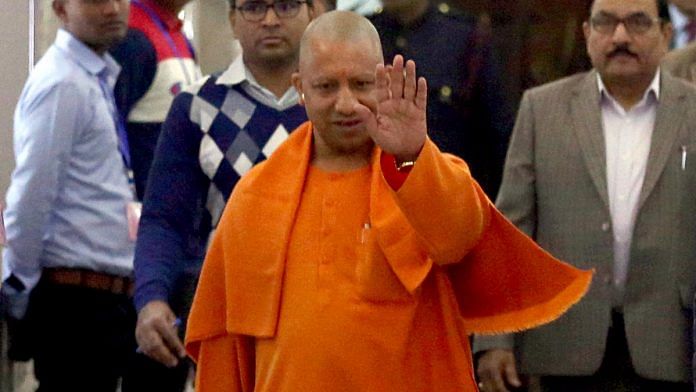New Delhi: The Uttar Pradesh government passed an ordinance Tuesday to deal with unlawful religious conversions. Most media reports have referred to it as an ordinance against ‘love jihad’ but the UP government claims that it tackles forceful conversion and not just the alleged phenomenon of ‘love jihad’.
In episode 626 of ‘Cut The Clutter’, ThePrint’s Editor-in-Chief Shekhar Gupta discusses this ordinance and also talks about the anti-conversion laws in different states.
Gupta read out a note by the UP government, which said, “We have brought out an effective law to check conversion with some stringent punitive provisions against individuals and organisations if found to have indulged in conversion, through manifestation of using force deceit by way of luring into marriage or any other improper manner.”
“Marriage is one of the things mentioned here, it doesn’t look like it is specifically directed at inter-faith marriages,” Gupta said.
According to the law, if a person intends to convert to another religion, he or she must serve a 60-day notice to the district magistrate. The magistrate will then carry out enquiries to see if the conversion is consensual or if blackmail or deceit is involved.
This also does not apply to the Special Marriage Act. People of different faith who wish to marry each other can still follow due procedure under the Special Marriage Act.
Also read: Not Ram Mandir, the ‘love jihad’ laws are the foundation of Hindu Rashtra
Anti-conversion laws in other states
Gupta noted that several states in the past, especially with large tribal populations, have passed laws against religious conversions, particularly because of Christian missionaries.
In 1967, Odisha was the first Indian state to pass a law against religious conversion — the Freedom of Religion Act, which had similar provisions. Madhya Pradesh followed with its own anti-conversion law in 1968. Arunachal Pradesh enacted a similar law in 1978.
In 2002, Tamil Nadu passed the Tamil Nadu Prohibition of Forcible Conversion Act, primarily directed at Christian missionaries.
A new generation of anti-conversion laws started in 2018 under the Narendra Modi government, Gupta said.
Both Uttarakhand and Himachal Pradesh added the word ‘marriage’ to their acts — Uttarakhand Freedom of Religion Act and Himachal Freedom of Religion Act — and said that even if conversion is done for marriage, it has to be notified.
In Uttarakhand, the law empowered the parents and siblings of the individual being converted with the right to go and complain to the district magistrate if they feel a conversion is taking place without following the regular process.
The law passed in Uttar Pradesh notes that forceful conversion is a cognisable and non-bailable offence. The punishments are also much higher than earlier — six months to three years in jail and a fine of Rs 10,000.
The UP government also made a reference to an Allahabad High Court judgment from September where the bench had said that if a conversion is carried out only for the sake of marriage, it is not valid.
On 11 November, another bench in the Allahabad High Court set aside the earlier judgment, calling it “incorrect”.
“In the earlier order that the UP government used, the religious equation was the reverse of what is being described as love jihad these days. In that case a Muslim girl converted to marry a Hindu boy,” Gupta said.
Also read: UP doesn’t need a new anti-conversion law. But India needs a stronger Special Marriage Act
Origin of ‘love jihad’
The idea behind ‘love jihad’ first came up in 1927. A rumour had spread in Uttar Pradesh’s Muzaffarnagar that a Hindu woman married a Muslim man and converted because of the marriage.
In the early 20th century, several Hindu reformers were talking about how Hindu women were being forcibly married to Muslims and converted.
“The impulse was building up that Muslims were taking away Hindu women,” Gupta said.
Then news began emerging from the Christian society in Kerala that a lot of Christian girls were being converted to Islam. Between 2006-2012, allegedly 447 Christian girls had been converted to Islam on the pretext of marriage.
The then Congress CM in Kerala, Oommen Chandy, admitted in the assembly that between 2006-2012, 2,667 women from other faiths had been converted to Islam because they married Muslim men.
“The Global Council of Indian Christians came up with the insinuation that a global Islamist project was being implemented in Kerala,” Gupta said. This caught spark after a Christian girl who had converted to Islam was arrested for supplying SIM cards to Lashkar-e-Taiba operatives.
“In Kerala some of this movement against a kind of love-jihad also came up from the Left — V.S. Achuthanandan (former chief minister of Kerala) said that Muslims were converting girls of other religions,” Gupta said.
Former Karnataka Deputy Chief Minister K. S. Eshwarappa was also pulled up by the Election Commission for making similar allegations in 2013.
“In its letter, the law is not that different from any of the laws enacted earlier, including in Arunachal Pradesh, Madhya Pradesh, Uttar Pradesh, Odisha in the 60-70s, if you see the spirit of the law, it is quite evident,” Gupta added.
He noted that most people convert for convenience because you need to submit a 30-day notice to marry under the Special Marriage Act and, in the interim, families can make life tough for these couples. Now, the conversion process has also increased to 60 days, which will make it even harder for such couples.
Therefore, Gupta said, the Special Marriage Act should be made more accessible to at least prevent conversion for the sake of convenience.
Watch the latest episode of CTC here:




Tamil Nadu later repealed the law, please research befire writing